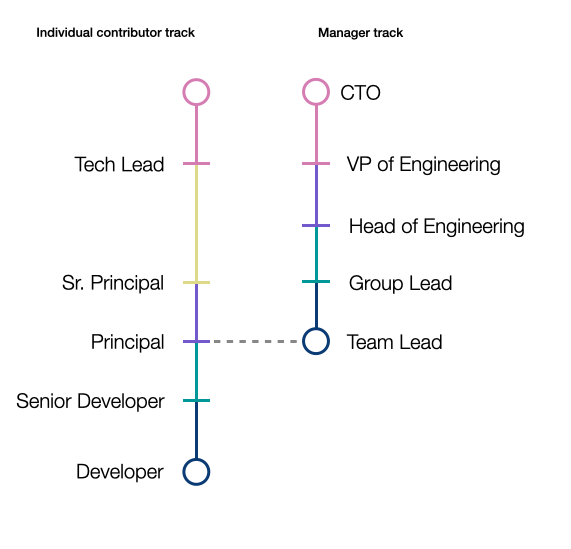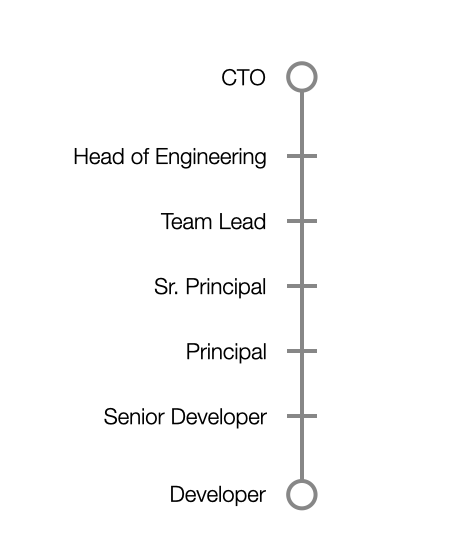Career Paths Aren't Always Linear, and That's OK

My dad just worked for 2 companies in his career, almost doing the same job for 50 years. My career was much different: After now 20 years, I already worked for 7 organizations and changed my profession 3 times. I studied electronics, but fast figured out that I don’t have a passion for hardware. I loved to write software. That’s why I was looking for a job in IT after university, and luckily a small company in Denmark gave me exactly that opportunity. 10 years and 3 employers later, I discovered that I not only had a passion for programming, but also for doing marketing. An Australian company called Atlassian was looking for a programmer in Germany that could help with their local marketing activities. Nowadays, you call this role a developer advocate. I got the job and loved it, and the marketing side grew strong in me. My next move was becoming the VP of Marketing for a small tech company. Quite a move from designing hardware.
A person changes jobs an average of 12 times during their career.

Especially in the tech industry, there are now jobs that didn’t exist 15 years ago: User experience designer, product manager, sec-ops engineer, social media manager, and many more. The technology world keeps changing all the time and our jobs will need to adjust to that. Also, our passion keeps changing. We might not want to do the same things for decades.
The only problem: Most of us feel some guilt about not following a practical, well-defined, safe path. A lot of people are afraid of stepping out of their comfort zone and doing something different, and most companies only paint a linear career path for their employees.
Companies should offer more than just one career path
We’ve learned the right career path is to step up to become a people leader and it’s tempting: We have significant impact on making strategic decisions and we sit at the same table with the important people in the company. Our title changes from senior developer to team lead to head of engineering. Sounds great, right? Start at the bottom, then work your way up into management.

But why? Not all of us are good at making strategic decisions or leading people. We have individual skills. These are two different crafts: The craft of an individual contributor and the craft of a manager.
As Sherif Mansour from Atlassian describes it: “A move into management isn’t seen as a ‘step up the ladder’ but rather a lateral move.”

It's a move to concentrate on working with people instead of working on software (even though you should still practice some hand-on programming as a leader, too). And yes, you can actually be paid more as an individual contributor than your manager.
Moving into different areas is great for employees and companies
We learned that we’ll get better and better in a job the more we’re practicing it. We learn the basics, start solving problems ourselves, help others to solve problems and become a master of our craft. From an individual perspective, this might be great, but it’s not the best thing for a company to have a crew of individual experts. In order to thrive, you need a diverse team with different skills and experiences. It’s great to have a product manager with a development background that understands the limitation of a technology being used.
As mentioned previously: Our fast-paced industry is inventing new roles constantly. We need people with experience and transferable skills to step out of their comfort zone and try to tip their toes into new or even established territories. Skill sets that prove to be relevant across a variety of job sectors create opportunities for people to be hired, but also within their companies. Facilitating non-linear career paths can also be a great way for organizations to keep the best talent around.
Not all of us feel comfortable to step into a new unknown territory but for those that are ready it’s a great way to enhance their careers.
A career turn is not a one-way street
After I became a VP of Marketing, I figured out that I was missing the programming relationship from my previous role and moved back to doing developer advocacy; first at a database company and now at Manfred. Without trying I wouldn’t have known. There is always a way back. You don’t lose your skills when trying out a new area. Don’t worry if such a move would look negative on your CV: Employers are looking for people that take ownership of a situation and not necessarily for someone that is really good at checking boxes that other people have drawn for them.

Or to say it with Devin Martin’s (founder of LifeStyle Integrity) words: “Focus less on the CV, more on the story that connects them. What’s becoming valuable are the capacities to pivot, to adapt, and synthesize, and these aren’t industry-specific.”

